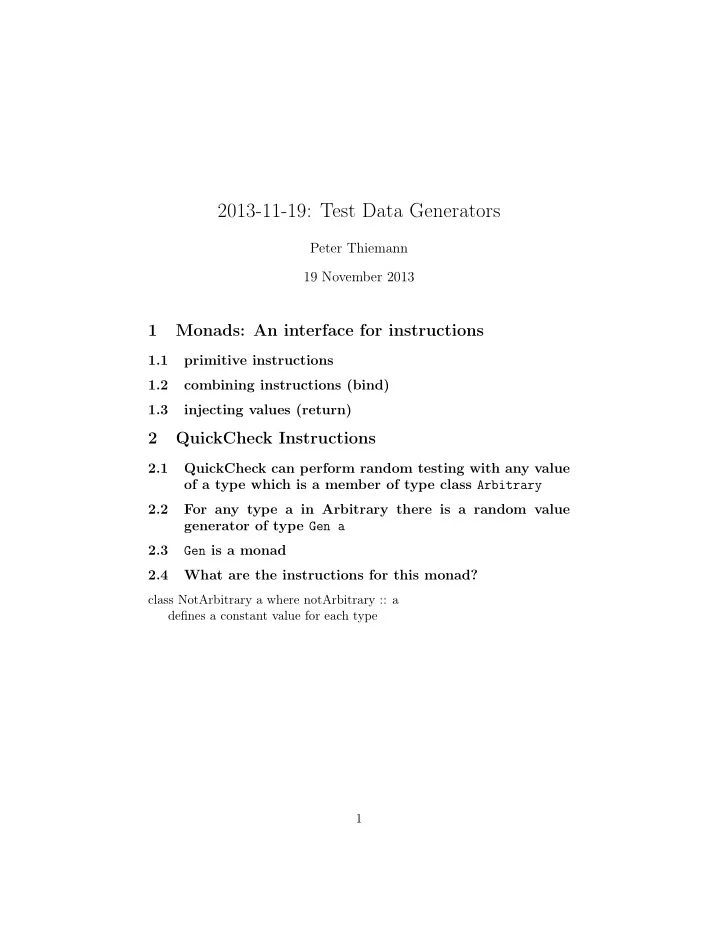

2013-11-19: Test Data Generators Peter Thiemann 19 November 2013 1 Monads: An interface for instructions 1.1 primitive instructions 1.2 combining instructions (bind) 1.3 injecting values (return) 2 QuickCheck Instructions 2.1 QuickCheck can perform random testing with any value of a type which is a member of type class Arbitrary 2.2 For any type a in Arbitrary there is a random value generator of type Gen a 2.3 Gen is a monad 2.4 What are the instructions for this monad? class NotArbitrary a where notArbitrary :: a defines a constant value for each type 1
3 IO vs GEN 3.1 IO a 3.1.1 Instructions to build a value of type a by interacting with the operating system. 3.1.2 Executed by the run-time system. 3.2 Gen a 3.2.1 Instructions to create a random value of type a 3.2.2 Executed by QuickCheck library functions. 4 Instructions for Test Data Generation 4.1 Why monad / instructions? 4.1.1 want to generate different data every time 4.1.2 construction method remains the same 4.2 Need data generation at different types Prelude Test.QuickCheck> :i Arbitrary class Arbitrary a where arbitrary :: Gen a shrink :: a -> [a] .. 5 Sampling 5.1 Testing of generators sample :: Gen a -> IO () generates a few value and prints them Prelude Test.QuickCheck> sample (arbitrary :: Gen Integer) Prelude Test.QuickCheck> sample (arbitrary :: Gen Boolean) Prelude Test.QuickCheck> sample (arbitrary :: Gen Doubles) Prelude Test.QuickCheck> sample (arbitrary :: Gen [Integer]) ,,, 2
6 Writing generators 6.1 The constant generator 6.1.1 return True always returns True 6.2 Using do notation Prelude Test.QuickCheck> sample $ doTwice (arbitrary :: Gen Integer) ... 6.3 Even integers evenInteger :: Gen Integer evenInteger = do n <- arbitrary return (2*n) 7 Generation Library 7.1 Choosing from a range choose :: Random a => (a, a) -> Gen a 7.2 Choosing between generators oneof :: [Gen a] -> Gen a 8 Example: Generating a Suit 8.1 Recall data Suit = Spades | Hearts | Diamonds | Clubs deriving (Show, Eq) 8.2 Generator for suits rSuit :: Gen Suit rSuit = oneof [return Spades, return Hearts, return Diamonds, return Clubs] 3
9 More generators 9.1 Choosing between elements elements :: [a] -> Gen a 9.2 Can you define elements using oneof ? 10 Generating a Rank data Rank = Numeric Integer | Jack | Queen | King | Ace deriving (Show, Eq) rRank = undefined 11 Generating a Card data Card = Card Rank Suit deriving (Show, Eq) rCard = undefined 12 Generating a Hand data Hand = Empty | Add Card Hand deriving (Show, Eq) rHand = undefined 13 Making QuickCheck Use Our Generators 13.1 QuickCheck is type agnostic 13.2 It works with any type that is an instance of Arbitrary instance Arbitrary Suit where arbitrary = rSuit 4
14 Datatype Invariants 14.1 Sometimes datatype contain unwanted values 14.2 Example: Numeric 0 14.3 Filtering the valid values validRank :: Rank -> Bool validRank (Numeric r) = 2 <= r && r <= 10 validRank _ = True 14.4 A datatype invariant which should always by True 14.5 Test it 15 Test Data Distribution 15.1 Problem: what are the successful test cases? 15.2 They could be insignificant values 15.3 It’s important to know the distribution of the test data prop_Rank r = collect r (validRank r) 15.4 collects and prints the tested values 16 Observing the Distribution of Ranks 17 Fixing the Generator rRank = frequency [ (1, return Jack), (1, return Queen), (1, return King), (1, return Ace), (9, do {r <- choose (2,10); return $ Numeric r})] 5
18 Distribution of Hands 18.1 Collecting each individual hand generats too much data 18.2 Collect a sumary instead, e.g., the number of cards numCards :: Hand -> Integer numCards Empty = 0 numCards (Add _ h) = 1 + numCards h 18.3 Collecting the distribution prop_Hand h = collect (numCards h) True 19 Fixing the generator 19.1 Returning Empty 20% of the time gives an average of 5 cards per hand rHand = frequency [ (1, return Empty), (4, do {c <- rCard; h <- rHand; return $ Add c h})] 20 Testing Algorithms 20.1 insert x xs 20.2 Inserts an element x into an ordered list xs 20.3 Result is also ordered prop_insert :: Integer -> [Integer] -> Bool prop_insert x xs = ordered (insert x xs) 20.4 Too weak: Precondition missing 21 Testing insert prop_insert’ :: Integer -> [Integer] -> Property prop_insert’ x xs = ordered xs ==> ordered (insert x xs) 6
21.1 However, it turns out that many test are very short: prop_insert’ :: Integer -> [Integer] -> Property prop_insert’ x xs = collect (length xs) $ ordered xs ==> ordered (insert x xs) 22 Probability that a random list is ordered 22.1 Length 0: 100% 22.2 Length 1: 100% 22.3 Length 2: 50% 22.4 Length 3: 17% 22.5 Length 4: 4% 23 Generating ordered lists from the start orderedList :: Gen [Integer] orderedList = undefined 24 Using a Custom Generator 24.1 The type should say that the list is ordered 24.2 Define a new type data OrderedList = Ordered [Integer] instance Arbitrary OrderedList where arbitrary = do {ol <- orderedList; return Orderedlist ol} 24.3 Testing insert properly prop_insert’ :: Integer -> Orderedlist -> Bool prop_insert’ x (Orderedlist xs) = ordered (insert x xs) 7
25 Summary 25.1 How to generate test data for quickCheck 25.1.1 Custom datatypes 25.1.2 Custom invariants 25.2 IO and Gen are both members of the Monad class (in- structions) 25.3 How to create our own instructions? 8
Recommend
More recommend